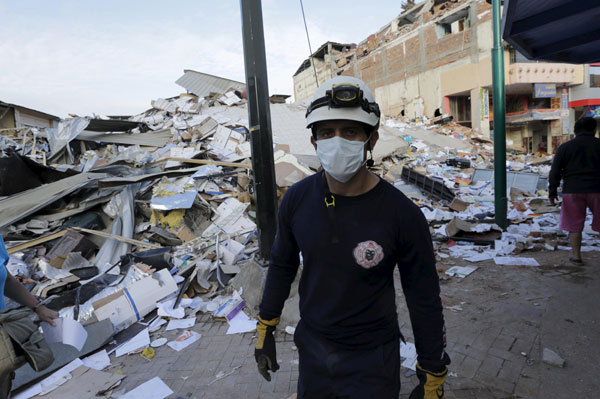Ecuador counts over 400 quake deaths, damage in the billions
(Agencies) Updated: 2016-04-19 10:52
 |
|
A rescue team member walks past a collapsed building after an earthquake struck off the Pacific coast, in Portoviejo, Ecuador, April 18, 2016.[Photo/Agencies] |
But the traumatized survivors Correa met on his rounds two days after the magnitude 7.8 quake had much more immediate concerns: many asked him for water.
With the death toll likely to rise further and swaths of flattened homes, roads and bridges coming to light, a visibly moved and grim-faced Correa warned that Ecuador's biggest disaster in decades would put a big toll on the poor Andean country.
"Reconstruction will cost billions of dollars," said Correa in the hard-hit city of Portoviejo, where survivors swarmed him asking for aid. The economic impact "could be huge," he added later.
Growth in the country of 16 million, which is largely dependent on oil and exports, was already forecast near zero this year due to plunging oil income.
The energy industry appeared to have dodged damage although the main refinery of Esmeraldas was closed as a precaution. However, exports of bananas, flowers, cocoa beans and fish could be slowed by ruined roads and port delays.
Michael Henderson, at risk consultancy Maplecroft, said Ecuador was less well equipped to recover than Chile, where a 2010 earthquake caused an estimated $30 billion in damage.
"Whereas Chile's economy was rebounding strongly from the global financial crisis ..., Ecuador has been slowing sharply recently as lower oil prices depress activity," he said.
"But total damage to assets in dollar terms may be quite a bit lower than in Chile due to the smaller magnitude of the earthquake and the fact that Ecuador is a much poorer country."







